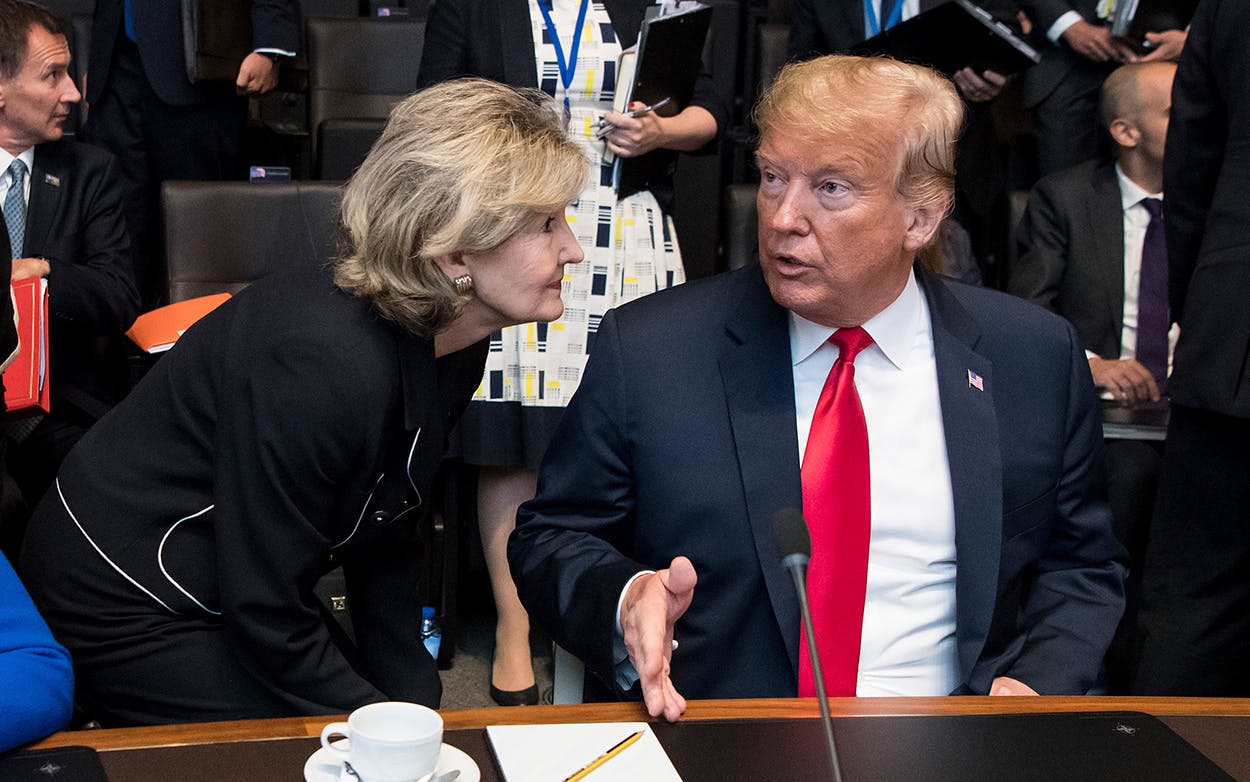Most politicians are gregarious, loquacious glad-handers, but not Kay Bailey Hutchison. She has always been proper and straitlaced. So I wasn’t surprised at the media reports of her apparent discomfort as President Trump berated world leaders at this week’s NATO summit. She looked grimly poker-faced sitting next to Trump while he reamed out our North Atlantic Treaty Organization allies as cheapskates who don’t do their fair share of picking up the cost of European defense, calling Germany a “captive” of Russia. Trump is just not her style, and when she took the job as his NATO ambassador last year I had to wonder, What’s she thinking?
Courtesy of the Washington Post.
But, for her, this may be like sitting through an uncomfortable Thanksgiving supper with a loud, brassy favorite uncle. When it comes to policy, she’s really not that far off from the boss.
During her tenure as a U.S. senator in 1997, she opposed the Clinton administration’s efforts to add the Czech Republic, Hungary, and Poland to NATO. Hutchison was a lonely voice in the Senate against the expansion. “If we dissipate our national defense budget when we do not face a true national security threat, we won’t be able to respond when we do face such a threat,” she said. Although the NATO expansion had the support of Texas defense contractors, she would not let that sway her. “I’m not going to put that into my factoring. I’m not going to base my position on NATO expansion on them selling F-16s that we will buy for people who don’t need them.” The three nations were added in 1999, and only Poland has met its financial obligations.
In 2000, Hutchison wrote an op-ed for several newspapers saying NATO was wasting resources in trying to be the international policeman in the Balkans when European members should be taking the leading role. “On the first anniversary of the beginning of NATO’s Operation Allied Force—the bombing campaign in Serbia—there is little to celebrate. In Kosovo, Serbs and ethnic Albanians have traded outright violence for a covert war of armed intimidation. Our European allies have not provided promised funds and police. American generals in the Pentagon are objecting to decisions made by American generals at NATO to assign U.S. forces to patrol in violent cities such as Mitrovica. Although the allies prevailed in the bombing campaign, the sad truth is that we cannot afford many more victories like this.”
Read the full text of Senator Hutchison’s guest column
During a period of domestic military base closings in 2003, Hutchison urged a review of foreign installations, especially questioning why the United States was keeping 80,000 troops in Germany when land war threats from Russia had dissipated. Germany had opposed disarming Iraq by force. “Not only do some bases fail to meet our national security needs, in some cases the host countries are openly antagonistic toward our troops,” Hutchison said. “Today’s threats don’t justify throwing precious defense funds at outdated installations.” Hutchison noted that troops involved in Iraq and Afghanistan had trained domestically. “The Cold War concept of training overseas is obsolete, yet our foreign basing structure to support that activity remains intact,” she said. “The process of when, how and why we base troops abroad is in need of a serious overhaul.”
Of course, any good politician knows how to sway with the times. Hutchison in April came to Texas with NATO Secretary General Jens Stoltenberg in part to tour the Lockheed F-35 Lightning II production plant in Fort Worth. “Eight NATO Allies currently participate in the F-35 program. It represents an important investment in the long-term capabilities of NATO to defend its citizens and face any threat,” said Ambassador Hutchison. “I am so proud of my fellow Texans here in Fort Worth in working with partners across the globe to provide state-of-the-art technology in defense of our country and our closest friends and Allies.”
Last October, at a forum hosted by the Washington Post, Hutchison said our European allies were not bothered by Trump’s leadership style, and she said the reports of a rocky relationship between President Trump and Secretary of State Rex Tillerson were overstated. “He and the president are working very well on the foreign policy issues,” she said. “There is no space between anyone in our administration—the leadership’s national security team, myself and Congress—about our support for NATO.” Five months later, in March 2018, Trump fired Tillerson.
In February, Hutchison pressed the European nations to commit to increasing their share of the cost of NATO to two percent of their nation’s GDP, exactly what Trump has been seeking. Hutchison said, “I know we talk two percent, but that’s because in the overall, that is what we need to have the capabilities and the ability to withstand any kind of threat, whether it be terrorism, hybrid, cyber, which are new threats that are fairly recent coming forward, as well as, of course, Russia’s interventions. So we hope everyone will make that step.”
So as you watch the video of the decorous, proper Hutchison sitting uncomfortably next to the Blusterer in Chief, know that it is his style and not his substance that is making her uncomfortable.
- More About:
- Politics & Policy
- Kay Bailey Hutchison
- Donald Trump






